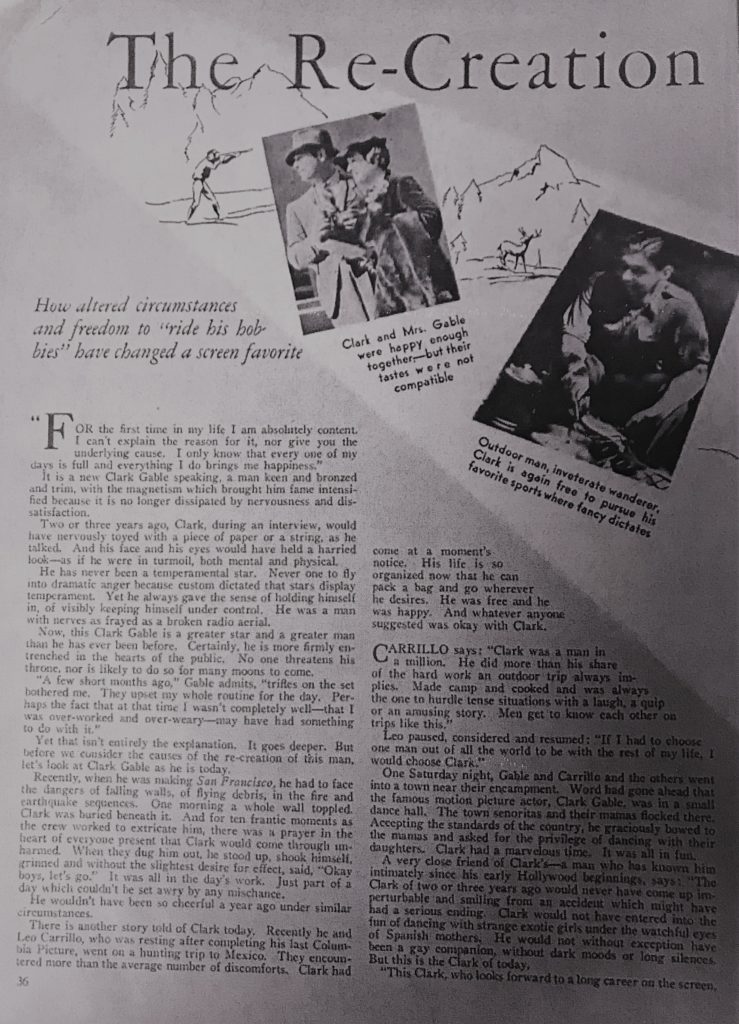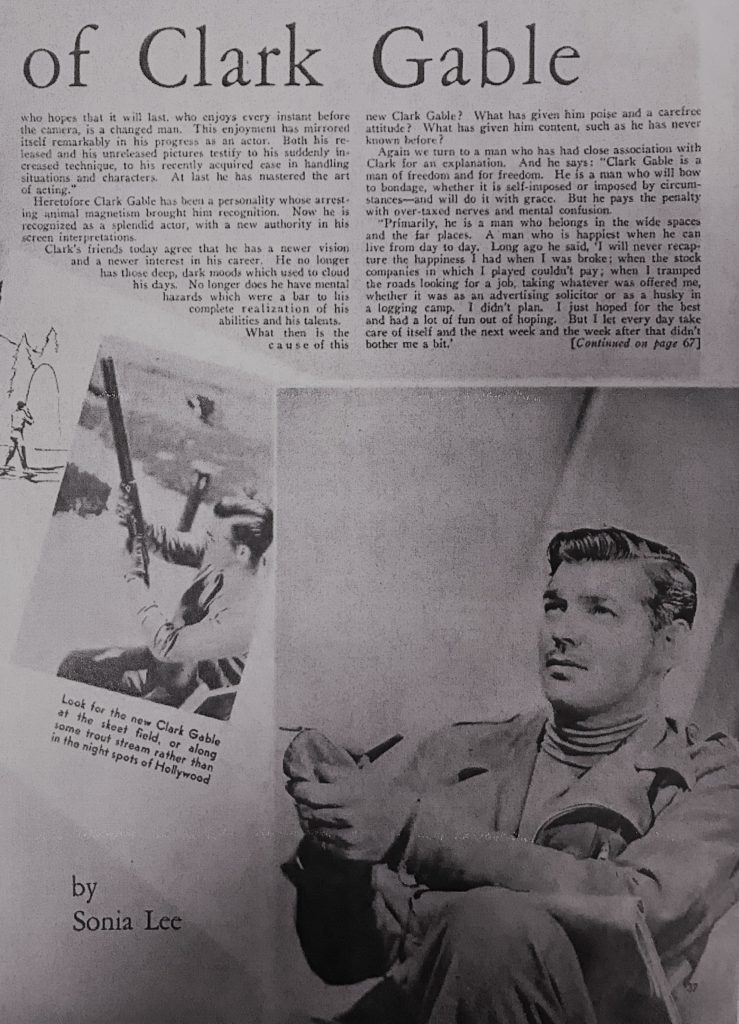1936: The Re-Creation of Clark Gable
The Re-Creation of Clark Gable
By Sonia Lee
Movie Classic magazine, September 1936
How altered circumstances and freedom to “ride his hobbies” have changed a screen favorite
“For the first time in my life I am absolutely content. I can’t explain the reason for it, nor give you the underlying cause. I only know that every one of my days is full and everything I do brings me happiness.”
It is a new Clark Gable speaking, a man keen and bronzed and trim, with the magnetism which brought him fame intensified because it is no longer dissipated by nervousness and dissatisfaction.
Two or three years ago, Clark, during an interview, would have nervously toyed with a piece of paper or a string, as he talked. And his face and his eyes would have held a harried look—as if he were in turmoil, both mental and physical.
He has never been a temperamental star. Never one to fly into dramatic anger because custom dictated that stars display temperament. Yet he always gave the send of holding himself in, of visibly keeping himself under control. He was a man with nerves as frayed as a broken radio aerial.
Now, this Clark Gable is a greater star and a greater man than he has ever been before. Certainly, he is more firmly entrenched in the hearts of the public. No one threatens his throne, nor is likely to do so for many moons to come.
“A few short months ago,” Gable admits, “trifles on the set bothered me. They upset my whole routine for the day. Perhaps the fact that at that time I wasn’t completely well—that I was over-worked and over-weary—may have had something to do with it.”
Yet that isn’t entirely the explanation. It goes deeper. But before we consider the causes of the re-creation of this man, let’s look at Clark Gable as he is today.
Recently, when he was making San Francisco, he had to face the dangers of falling walls, of flying debris, in the fire and earthquake sequences. One morning a whole wall toppled. Clark was buried beneath it. And for ten frantic moments as the crew worked to extricate him, there was a prayer in the heat of everyone present that Clark would come through unharmed. When they dug him out, he stood up, shook himself, grinned and without the slightest desire for effect, said, “Okay boys, let’s go.” It was all in a day’s work. Just part of a day which couldn’t be set awry by any mischance.
He wouldn’t have been so cheerful a year ago under similar circumstances.
There is another story told of Clark today. Recently he and Leo Carrillo, who was resting after completing his last Columbia Picture, went on a hunting trip to Mexico. They encountered more than the average number of discomforts. Clark had come at a moment’s notice. His life is so organized now that he can pack a bag and go wherever he desires. He was free and he was happy. And whatever anyone suggested was okay with Clark.
Carrillo says: “Clark was a man in a million. He did more than his share of the hard work an outdoor trip always implies. Made camp and cooked and was always the one to hurdle tense situations with a laugh, a quip or an amusing story. Men get to know each other on trips like this.”
Leo paused, considered and resumed: “If I had to choose one man out of all the world to be with the rest of my life, I would choose Clark.”
One Saturday night, Gable and Carrillo and the others went into a town near their encampment. Word had gone ahead that the famous motion picture actor, Clark Gable, was in a small dance hall. The town senoritas and their mamas flocked there. Accepting the standards of the country, he graciously bowed to the mamas and asked for the privilege of dancing with their daughters. Clark had a marvelous time. It was all in fun.
A very close friend of Clark’s—a man who has known him intimately since his early Hollywood beginnings, says: “The Clark of two or three years ago would never have come up imperturbable and smiling from an accident which might have had a serious ending. Clark would not have entered into the fun of dancing with strange exotic girls under the watchful eyes of Spanish mothers. He would not without exception have been a gay companion, without dark moods or long silences. But this is the Clark of today.
“This Clark, who looks forward to a long career on the screen, who hopes that it will last, who enjoys every instant before the camera, is a changed man. This enjoyment has mirrored itself remarkably in his progress as an actor. Both his released and his unreleased pictures testify to his suddenly increased technique, to his recently acquired ease in handling situations and characters. At last he has mastered the art of acting.”
Heretofore Clark Gable has been a personality whose arresting animal magnetism brought him recognition. Now he is recognized as a splendid actor, with a new authority in his screen interpretations.
Clark’s friends today agree that he has a newer vision and a newer interest in his career. He no longer has those deep, dark moods which used to cloud his days. No longer does he have mental hazards which were a bar to his complete realization of his abilities and talents.
What then is the cause of this new Clark Gable? What has given him poise and a carefree attitude? What has given him content, such as he has never known before?
Again we turn to a man who has had close association with Clark for an explanation. And he says: “Clark Gable is a man of freedom and for freedom. He is a man who will bow to bondage, whether it is self-imposed or imposed by circumstances—and will do it with grace, But he pays the penalty with over-taxed nerves and mental confusion.
“Primarily, he is a man who belongs in the wide spaces and the far places. A man who is happiest when he can live from day to day. Long ago he said, ‘I will never recapture the happiness I had when I was broke; when the stock companies in which I played couldn’t pay; when I tramped the roads looking for a job, taking whatever was offered me, whether it was as an advertising solicitor or as a husky in a logging camp. I didn’t plan. I just hoped for the best and had a lot of fun out of hoping. But I let every day take care of itself and the next week and the week after that didn’t bother me a bit.’
“In a measure, Clark has recaptured his attitudes of long ago. He has no worries or responsibilities or obligations to fetter him. He is the sort of man who wants to be free to follow his fancies—to go hunting, to go fishing, to let his beard grow, to wear a grubby leather jacket and to live in a world of men.
“Which brings us to his marriage, which Clark has never discussed. But certainly, marriage for Clark meant a division in his personality. He has never been a ladies’ man—a man could dance attendance according to a definite set of rules. He is a man for gay friendship and steady comforting companionship—but a man who must of necessity occasionally put aside those friendships, put aside those companionships, and live with himself.
“In many respects Clark Gable is a little boy—as all men of creative ability are. To be content, Clark must never be made to feel inefficient or insufficient. He must never have the sense of hurting anyone or of shirking his responsibilities.
“He must always have the approval of his wife and of his friends. And never for one moment feel that he is subtracting from the happiness of anyone.
“Definitely in his marriage to Ria, he felt that his masculine interest interfered with the routine of marriage. He considered that a wife was entitled to the undeviating companionship of her husband. So when Clark went on a hunting trip or a camping trip or a fishing trip, his pleasure was always diluted by the sense that he was unfair to Ria,
“His horizons are broad. His playground is the world. But he must never have any tugging at his loyalties or those loyalties in themselves—feel betrayed. Now, with the separation between Clark and Ria, he has come into his own estate again. A man who has recaptured a sound philosophy, responsible only to himself and to the fine code of living, which is his. A man who says—‘I think living is swell and fun.’”
There has been considerable gossip in Hollywood that Clark and Ria will come together again. They have remained friends. They have had certain problems which inevitably arise when a man and a woman married to each other, separate. Certainly, there has been no rancor publicly aired. Which is decent and honest and civilized. Perhaps the old habits of marriage will reassert themselves.
Certainly, if this marriage ends in divorce, Clark will marry again. Perhaps a woman who as fiercely wants to defend her freedom as Clark is defending his. Perhaps a woman who can make him feel that no matter what he does, is right. There have been rumors of late that he is romantically interested in Carole Lombard. They have been seen together—happily together—on many gay occasions in Hollywood’s popular resorts.
Inevitably, of course, Clark will have seen all of the places of which he has only dreamed in the past. He will cross the Pacific by Clipper Ship to China. He will cross the Atlantic by air. He will have seen north and south and east and west. And having seen and having been, he may become satiated with freedom, satiated even with belonging to himself completely.
And when that time comes, Clark will draw up a chair to the fire, hunt for his slippers, and become the complete family man.

